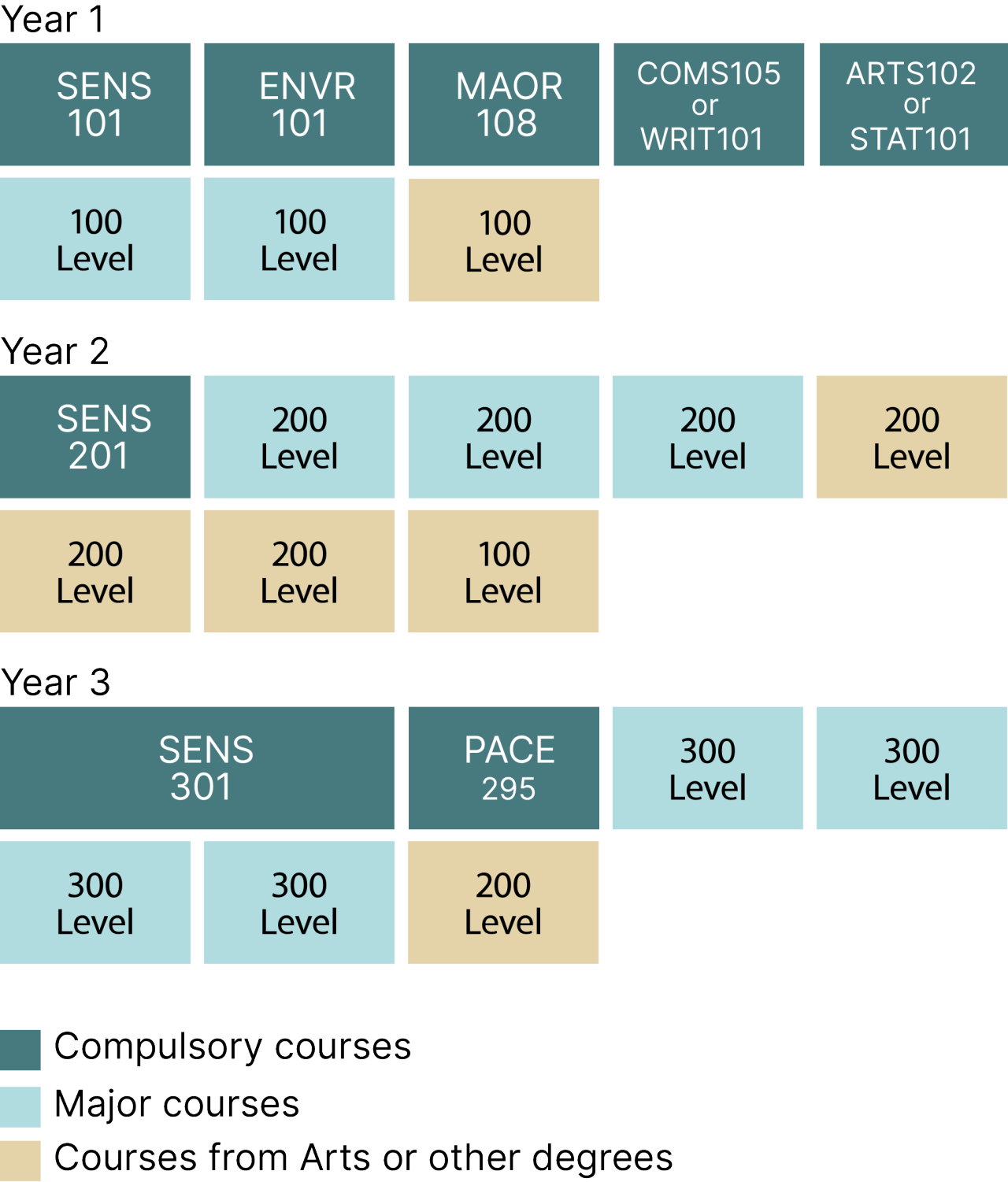Bachelor of Social and Environmental Sustainability
- Degree Structure - Start In
- Semester 1 or 2 (February or July)

Explore the biggest global issues we face, and help build a sustainable future.
360
The BSEnS explores the biggest problems we face globally, from pollution and climate change to world hunger.
You will gain meaningful skills including understanding how and why these issues happen, and the actionable steps we need to change these.
Help us build a sustainable and equitable future in business, policy, and global society.
To enrol in the degree, you will need:
For the full entry requirements, see the Regulations for the Bachelor of Social and Environmental Sustainability or use the admission requirements checker.
See Admission and enrolment for all information on enrolling at UC.
Anyone from any study background will be able to study the BSEnS.
Interests in environmental science and sustainability, voluntary work, economics, or social change will be particularly useful to get the most out of study. Strong communications skills will also be very helpful.
The Bachelor of Social and Environmental Sustainability is made up of a total 360 points:
A minimum of 225 points must be from courses above 100-level, with at least 90 points at 300-level.
The degree takes 3 years of full-time study, or can be studied part-time for up to 10 years.
For the full degree requirements, see the Regulations for the Bachelor of Social and Environmental Sustainability.
BSEnS students have the option of completing either:
Each major has specific course requirements, but all consist of a minimum of 135 points, with at least 45 points above 100-level and at least 60 points at 300-level.
A minor consists of a minimum of 75 points, including at least 45 points above 100-level, in a single subject chosen from Arts, Commerce, Digital Screen, Health, Product Design, Science, Sport, or Youth and Community Leadership degrees.
It is possible to study a BSEnS alongside other degrees at the same time, such as the Bachelor of Science or Bachelor of Health Sciences.
Find out more information about Double degrees.
You can study a conjoint degree and merge your BSEnS with options such as the Bachelor of Engineering with Honours or Bachelor of Youth and Community Leadership, so that you can complete major subjects from multiple areas in a shorter timeframe.
Find out more information about Conjoint degrees.
The BSEnS degree includes compulsory courses to introduce you to sustainability systems thinking for change, and to develop key skills in communication, problem-solving, indigenous partnerships, and community leadership.
You will also choose a major to study throughout the degree, and you may also choose to complete a minor.
Year 1
Year 2
Year 3
2025 tuition fee estimate: $7,298 per 120 points
2026 tuition fee estimate: $7,736 per 120 points
2025 tuition fee estimate: $34,990 per 120 points
2026 tuition fee estimate: $36,355 per 120 points
2027 tuition fee estimate: $37,960 per 120 points
Tuition fees vary for each course, depending on the subject area and course level, so your final total may differ from the estimates provided above. Select your courses in the Fees Estimator to calculate your total tuition costs.
2025 SSL: $9.72 per point ($1,166.40 per 120 points)
2026 SSL: $10.30 per point ($1,236.00 per 120 points)
You may choose to continue on to the Bachelor of Arts with Honours, Master of Arts, or Master of Arts (Thesis) in a variety of related subjects, such as Political Science and International Relations or Geography.
UC also offers many master's degrees with a focus on environmental change and social systems, for example:
Find out more about what can you do with a degree from UC.

Each small block represents a 15-point course. However, some courses may be 30 points or more.
This diagram is an example only – other combinations are possible. For specific course requirements, see the Regulations for the Bachelor of Social and Environmental Sustainability.
By clicking "Accept All Cookies", you agree to the storing of cookies on your device to enhance site navigation, analyse site usage, and assist in our marketing efforts.
0800 827 748 (within NZ)
+64 3 369 3999
Ext: 92111 (from a campus landline)
Direct dial: 0800 823 637
University of Canterbury | A Fair Trade University
